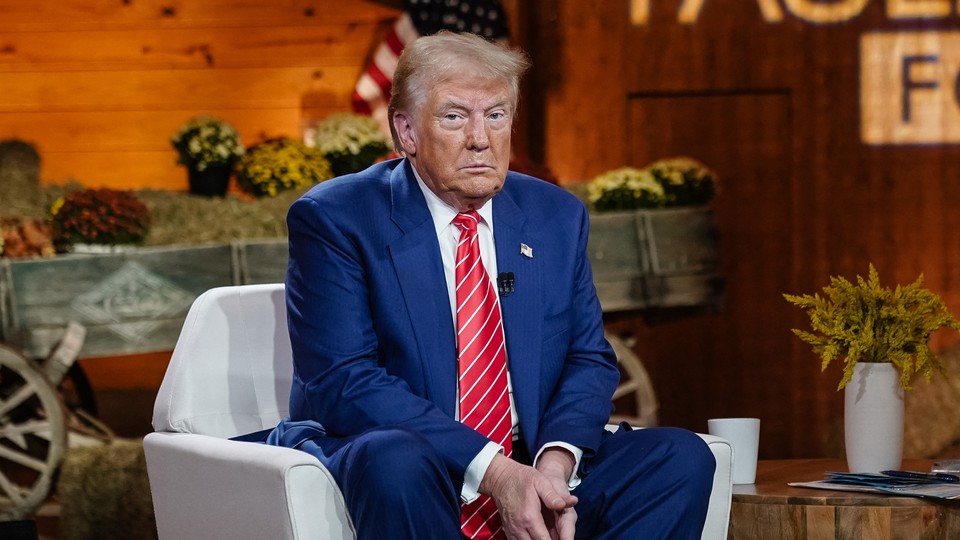Trump’s ‘Day of Love’ Caps a Bizarre Week
8 min read
This is an edition of The Atlantic Daily, a newsletter that guides you through the biggest stories of the day, helps you discover new ideas, and recommends the best in culture. Sign up for it here.
You know the expression and what it means, but I will use only the abbreviation: WTF. In military circles, it is rendered as “Whiskey Tango Foxtrot.” On the show The Good Place, it is “What the fork.” I think I have a pretty good vocabulary, but I find myself at a loss for any other way to describe a week in American electoral politics that must rank among the most bizarre in modern times.
Trump, of course, tops the leaderboard for gobsmacking moments, and this week, his comments ran the gamut from vile to hilarious to head-scratching. Even so, nothing could match his description of the January 6 insurrection—one of the darkest moments in American political history—as “a day of love.”
This vertigo-inducing moment occurred during Trump’s Univision town hall two nights ago. A Cuban American construction worker named Ramiro González said that he was “disturbed” by Trump’s behavior on January 6 but wanted to give Trump a chance to win back his vote. Trump’s answer was a slurry of sentence fragments and passive constructions, but its mendacity was unmistakable:
Some of those people went down to the Capitol, I said, peacefully and patriotically, nothing done wrong at all. Nothing done wrong. And action was taken, strong action. Ashli Babbitt was killed. Nobody was killed. There were no guns down there. We didn’t have guns. The others had guns, but we didn’t have guns. And when I say “we,” these are people that walk down, this was a tiny percentage of the overall, which nobody sees and nobody shows.
Everything was fine, you see, but “action was taken.” By someone. For some reason. Note also that Trump aligns himself with the insurrectionists: “We” didn’t have guns; “they” had them. (This is a lie: Some of the rioters were armed.) And then Trump concluded: “But that was a day of love, from the standpoint of millions …”
A “day of love” is one way to put it. Other ways to put it, of course, are “one of the worst days for American law enforcement since 9/11” and “the first time a hostile force carrying Confederate flags managed to breach the Capitol.” In response to Trump’s words, the former Capitol police officer Aquilino Gonell went on X and posted a video of the mob attacking him. “Here’s me receiving an outpouring amount of affection during the ‘day of love,’” he said, adding, “They almost loved me to death.”
González has now said that he was not convinced by Trump’s response and will not be voting for him. But millions of other voters have continued to support Trump despite his obvious approval of this brutal attack on our constitutional order. I had hoped, however, that by now, Trump might be shunned among political and cultural leaders—at least by those who have not already bent the knee. After everything Trump has said and done, why would any decent person want him to stand among a group of dignitaries while he curses, makes bad jokes, and does some of his usual rally shtick?
Which brings me to the Al Smith dinner.
The Smith dinner, named after one of the great governors of New York (and the first Catholic major-party nominee for president), is a formal-dress charity event hosted by the Catholic archbishop of New York. Politicians attend (especially during an election year) to give speeches and engage in some good-natured banter and camaraderie.
Trump, of course, has no evident good nature. His previous in-person appearance at the dinner was in 2016, and it was so shameful and mean-spirited that, as The New York Times noted this morning, Trump and his wife “slunk out of the room the second it was over.” This year was no better. Kamala Harris had the good sense not to attend, and sent a video message instead. (It wasn’t very good comedy, but so it goes.) Trump showed up in person, however, and made sure to be just as offensive and rude as he had been eight years before.
The point is not that Trump is too bilious to be funny; the point is that Senate Majority Leader Chuck Schumer, Archbishop Timothy Dolan, and many others who should know better sat there and pretended that Trump was just a regular political candidate soft-shoeing his way through an Al Smith dinner. All of these people should have refused to share a stage with Trump, but the dinner was another example of what Jonathan Last acidly—and rightly—calls “Kabuki Normality,” the careful pretense that all is well, and that appearing with a convicted felon, a man found liable for sexual abuse, a racist and a misogynist and a “fascist to the core,” is just another day at the office for the leader of New York’s Catholics and the senior Democratic senator from New York.
Elsewhere, Trump’s running mate, J. D. Vance, has finally decided to take a stand on a question he’s been weaseling out of answering for weeks: Did Trump lose to Joe Biden? “No,” he said to a reporter during a question-and-answer session at an event in Pennsylvania this week. “I think there are serious problems in 2020. So, did Donald Trump lose the election? Not by the words that I would use, okay? … I really couldn’t care less if you agree or disagree with me on this issue.”
Even by the Ohio senator’s standards of disdain, this signals a new level of contempt. Yet Vance’s embracing of the Trump campaign’s Big Lie caused barely a ripple in the national consciousness today—because Trump was busy flooding the zone with nutty, baffling answers on Fox & Friends this morning.
Asked who his favorite president was when he was little, Trump said, “Ronald Reagan.” Reagan took office when Trump was in his mid-30s. Trump went on to claim that Fox staffers wrote some of his jokes for the Smith dinner (which Fox denied). He did his usual riffs about Harris and her IQ; said that if she is elected, we will no longer have cows—no, I don’t get it either—and disparaged Abraham Lincoln. Lincoln was “probably a great president,” Trump allowed, “although I’ve always said, why wasn’t that settled?”
He meant the Civil War.
Trump finished up by saying he was going to go talk to Fox owner Rupert Murdoch and demand that Murdoch stop Fox from running “negative” Harris-campaign ads about Trump—“and then we’re going to have a victory.”
It’s normal to both express shock and laugh at such things, but none of this is funny. Trump is unfit to enter the White House. He is unstable, disordered, and morally repulsive. Yet today, the election could be a coin toss. If Trump wins, in January, he will sit behind the Resolute desk, and military aides will once again walk him through the process to order the use of nuclear weapons.
No phrase or expletive is enough to capture that terrifying possibility.
Related:
- Trump isn’t bluffing.
- Trump breaks down onstage.
Here are three new stories from The Atlantic:
- Trump is speaking like Hitler, Stalin, and Mussolini, Anne Applebaum writes.
- Abortion pills have changed the post-Roe calculus.
- The “peak obesity” illusion
Today’s News
- A federal judge ordered the release of heavily redacted documents in Special Counsel Jack Smith’s federal election-subversion case against Donald Trump.
- A federal judge yesterday ordered the DeSantis administration to stop threatening to bring criminal charges against TV broadcasters for running an ad supporting abortion rights.
- Hamas confirmed that its leader, Yahya Sinwar, was killed in Gaza by the Israeli military. Hamas and Israel continue to show resistance to ending the war.
Dispatches
- Atlantic Intelligence: AI executives are suddenly saying that superintelligence is just around the corner, Matteo Wong writes. But these prophecies might not come from a place of strength.
- The Books Briefing: Who owns an idea? Cases of loose inspiration or coincidental convergences in art force us to rethink what originality really means, Boris Kachka writes.
Explore all of our newsletters here.
Evening Read

The Weak Science Behind Psychedelics
By Olga Khazan
No psychiatric treatment has attracted quite as much cash and hype as psychedelics have in the past decade. Articles about the drugs’ surprising results—including large improvements on depression scores and inducing smokers to quit after just a few doses—earned positive coverage from countless journalists (present company included). Organizations researching psychedelics raised millions of dollars, and clinicians promoted their potential to be a “new paradigm” in mental-health care. Michael Pollan’s 2018 psychedelics book, How to Change Your Mind, became a best seller and a Netflix documentary. Psychedelics were made out to be a safe solution for society’s most challenging mental-health problems.
But the bubble has started to burst.
Read the full article.
More From The Atlantic
- A radical vision of the sick body
- The scourge of “win probability” in sports
- The age of AI child abuse is here.
- The collapse of the Khamenei Doctrine
Culture Break

Game on. Jake Retzlaff is in a strange position as Brigham Young University’s star quarterback, McKay Coppins writes. As a Jewish student, he represents one of the university’s smallest minorities—and he’s also one of its most famous students.
Read. Alia Trabucco Zerán’s new novel, Clean, is a domestic thriller that shatters Chilean myths.
Play our daily crossword.
P.S.
I took a shot at Harris’s recorded contribution to the Smith dinner, but Harris herself was fine. She has reasonable comic timing and made a few chuckle-worthy comments. But her video featured the actor Molly Shannon as “Mary Katherine Gallagher,” a character Shannon created for Saturday Night Live when she was a cast member, back in the 1990s. I have nothing against Shannon, but I’ve never liked that character—and neither did audiences when the skit moved to the big screen. Superstar has a rating of 32 percent on Rotten Tomatoes, and having seen parts of it—I could not sit through a full viewing—I’d say that’s generous.
I watched the very first episode of SNL in 1975: I was 14, and there was no way I was going to miss George Carlin. The show is part of my American pop-culture DNA, and I have acquired a mental encyclopedia of its characters, good and bad, by televisual osmosis. We all remember the greats: I recently watched an old episode of Mission: Impossible featuring Fernando Lamas, and all I could hear was Billy Crystal. I even remember characters from SNL’s disastrous 1980–81 season. (In the ’90s, Julia Sweeney’s character “Pat,” the star of a skit about a person of indeterminate gender, got a movie too. It was so bad that its distributor took it off the release schedule almost immediately after its premiere; it has the infamous zero percent rating on Rotten Tomatoes.)
I get that Mary Katherine is a Catholic character and the context was the Al Smith dinner, but this election season is straining my sense of humor.
— Tom
Stephanie Bai contributed to this newsletter.
When you buy a book using a link in this newsletter, we receive a commission. Thank you for supporting The Atlantic.



